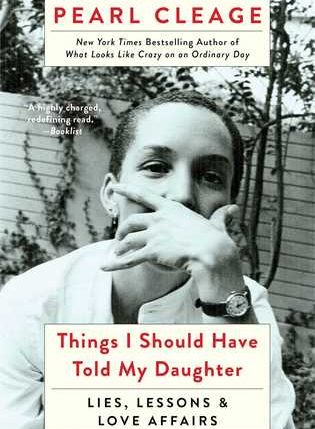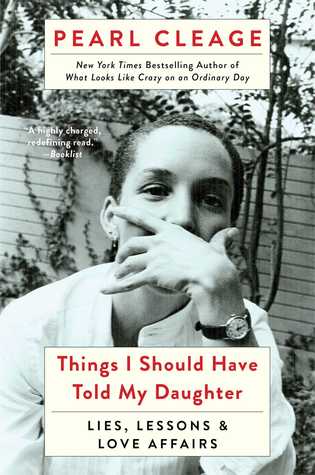
Book Review: Things I Should Have Told My Daughter – Pearl Cleage
Danielle Dorky reviews New York Times Bestselling author Pearl Cleage’s new journal memoirs Things I Should Have Told My Daughter, a self-portrait that takes women’s confessional literature to a new standard.
Author: Pearl Cleage
Book Title: Things I Should Have Told My Daughter
Genre: Creative nonfiction, Memoir/Biography
Length: 308 pages hardcover
Publish date: 2014
Publisher: Atria Books
Previous books: What Looks Like Crazy on an Ordinary Day, I Wish I Had A Red Dress
Similar books/authors: American Cocktail: A Colored Girl in the World by Anita Reynolds
Re-readability: 9 out of 10
Dorkproval rating: [Rating:9.5/10]
Favorite Quote: “We were so willing to take on everything. At what point does all that change? At what point does fighting at every point become too bothersome; too time-consuming and too embarrassing? At what point do we become old people and workers and so concerned about all the shit that stops us from living on the edge?…I will fight back! I will not be a content, amused thirty-year-old! I will rage, rage against the dying of the light!”
I can’t help but smirk at the irony of reviewing such a book, which to some will still be considered controversial, on Mother’s Day. Things I Should Have Told My Daughter contains the selected journal entries of one of America’s most celebrated living playwrights between the years of 1970 and 1988. Pearl Cleage details her time working as a speechwriter for Atlanta’s first black mayor Maynard Jackson, the struggles of balancing motherhood with one’s own endeavors, and the all-too-familiar insecurities of being a working writer and pursuing artistic passions.
Mothers, daughters, artists, late bloomers, self-doubters, feminists, and occasional hypocrites will all love this book. Cleage’s journal entries volley between freeform poetry and stoned epiphanies, but one thing that remains consistent is her unadulterated, startling honesty. She details her fears, shortcomings and growth, and as tempting as it must have been, does not interject from the present to defend her decisions or mistakes.
Cleage is 22-years-old at the start of her book. She is bright-eyed and naive, working for a man who will soon be one of the most powerful in Atlanta, Georgia. She has a supportive, driven husband and is steadily gaining attention for her work, though she would prefer to be writing creatively instead of doing PR or copy. Like most early twenty-somethings, she makes and breaks promises to herself, she is impulsive and unapologetic, still navigating the world primarily through want and instinct.
Cleage gives birth to her daughter Deignan when she is 26, and moves into her thirties with the wisdom that recent motherhood brings, regarding the world as a much bigger space that she must improve for the sake of her daughter. Her husband, Michael Lomax, seeks to pursue his own political aspirations, making Pearl realize that she will have to learn to smile on cue and bite her tongue. An affair that is only mentioned in vague, uncertain terms occurs.
Cleage throttles into the 80’s as a free woman intent on selling work that is important and meaningful to her. She takes on several lovers. She smokes a lot of marijuana and goes to parties attended by Richard Pryor, James Baldwin and other notable African American figures. The way Pearl describes her life in the 80’s reminds me of something someone once said about motown music: namely, it makes the listener (or in this case, reader) feel like nothing was cooler than being black at that time, where she was. Of course her time was not without trials, she constantly had to defend and sometimes compromise her work to increase visibility. People were interested in hearing or reading alternative narratives, but they preferred stories about black life written from the perspective of white people, who could package together neat endings that made everyone feel progressive and united.
Another thing that struck me about Things I Should Have Told My Daughter was Cleage’s growth as a feminist and how her feminism was not correlated to hating men, or making the best, most feminist decision in every situation. Like many of us, there were times she prioritized temporary pleasure over security or even respect. There were times she knew she should leave, or ignore that phone call, or go out with friends, and did the opposite instead. So often, women who struggle and fight for their rights and the rights of others are held on a pedestal. We expect them to have an impossible foresight when it comes to relationships and for their feminist politics to carry over completely into their personal lives. Surely a woman who fights for other women’s freedoms would not allow herself to be emotionally manipulated by a man, would never prefer an evening of orgasms to a roundtable discussion about today’s politics, would she? She might. We are all human, all weak in our flesh, as Ms. Cleage makes evident in her memoirs.
The book was also validating in that Cleage didn’t begin to find notable, mainstream success until her mid- to late 30’s. It seems almost every day on my Facebook feed there is a new video or article of some ridiculously young person being ridiculously successful and talented beyond their years. It’s worth remembering that everyone isn’t meant to be an early success. Everyone can’t write their Great American Novel or release a platinum selling album before they’ve passed their driving exam. For some of us, the ideas have to simmer and develop a little longer.
After finishing my copy of Things I Should Have Told My Daughter, I sat in contemplation of all that Cleage accomplished in those pages, and all that she went on to achieve after they ended in 1988. Eleven books and five plays were published and produced after that. Pearl turned 65 shortly before this book went to print. If Things I Should Have Told My Daughter taught me anything, it’s not to let anyone tell me what and when I can and cannot do.
You may remember me originally highlighting this book in my 2014 Dorky Literature Forecast. I promised to review the two books with the most votes and Things I Should Have Told My Daughter won, along with Debbie Doesn’t Do It Anymore by Walter Mosley. I should be receiving my copy of Debbie Doesn’t Do It Anymore this week so stay tuned for the review and feel free to pick up your own copy to read with me!
Categories: Reviews

